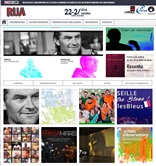Resumo
As relações urbanas são atravessadas por um embate entre a organização administrativa do espaço pelos órgãos oficiais e as práticas cotidianas que buscam alternativas frente ao poder do Estado. Neste artigo, é analisado o modo como esse embate produz estratégias e práticas econômicas alternativas na cidade americana de Detroit para escapar da chamada “crise urbana” no Capitalismo contemporâneo. São descritas outras formas de pensar um modelo urbano,concebido e apoiado pela participação dos cidadãos e seu “poder de agir” mediante o uso de objetos tecnológicos. A análise de entrevistas com os sujeitos destas diferentes práticas aponta para uma vontade de reconexão, buscando engendrar uma dinâmica da mudança social na relação com as infraestruturas tecnológicas.Referências
AKRICH, M. Comment décrire les objets techniques?. In: Techniques et Culture, vol. 9, p. 49-64, 1987.
ALINSKY, S. Rules for radicals: a practical primer for realistic radicals. New York: Random House, 1971.
BEAUDOUIN, V. Prosumer. In: Communications, n. 89, p. 131-139, 2011.
CARDON, D. La démocratie Internet Promesses et limites: La République des idées. Paris: Seuil, 2010.
CASTELLS, M. The Information Age: Economy, society and culture, Blackwell, Oxford, 2010 [first edition 1996-1998].
CASTELLS, M. Ni dieu ni maître: les réseaux, Leçon inaugurale de la Chaire Analyse interdisciplinaire de la société en réseaux, 28 juin 2011, Collège d’études mondiales, Fondation Maison des sciences de l’homme, Paris, 2011.
CLERVAL, A, L’Humanité.fr, “À Paris, le discours sur la mixité sociale a remplacé la lutte des classes”, 17 octobre 2013. Disponible en: [http://www.humanite.fr/societe/anne-clerval-parisle-discours-sur-la-mixite-socia-551401].
COSME, C. Politique de la ville, l’expérience américaine, Centre d’analyse stratégique, la documentation Française, Paris, 2012.
DENIS, J. & PONTILLE, D. Petite sociologie de la signalétique: Les coulisses des panneaux de métro. Paris: Presses de l’École des mines, 2010.
DUMAZEDIER, JVers une civilisation du loisir?. Paris: Seuil, 1962.
EGYEDI, T. AND MEHOS, D. Inverse infrastructures Disrupting Networks from Below. Northampton: Edward Elgar, 2012.
FEENBERG, A. Les dix paradoxes de la technologie. In: La Recherche et l’Innovation en France – FutuRIS 2011 (éd. Odile Jacob). Paris: Association nationale de la recherche et de la technologie, 2011.
FEENBERG, A. Repenser la technique. Paris: La Découverte M.A.U.S.S, 2004.
FLICHY, P. Internet et le débat démocratique. Réseaux, n.150, p. 159-185, 2008.
GALLAGHER, J. Reimagining Detroit: Opportunities for Redefining an American
City. Detroit: Wayne State University Press, 2010
GALLAGHER, J. Revolution Detroit: Strategies for Urban Reinvention. Detroit: Wayne State University Press, 2013.
GENTÈS, A. & HUGUET, F. Les alternatives aux réseaux sociaux: l’architecture distribuée et le design de média. In Réseaux sociaux, culture politique et ingénierie des réseaux sociaux (dir. Stiegler, B.), IRI {FYP} éditions, Paris, 2012.
GERBAUDO, P. Tweets and the Streets, Social Media and Contemporary Activism London: Pluto Press, 2012.
GOËTA, S. Détroit n’est pas une silencieuse ville sauvage. [La critique, par Aaron Handelsman]. Disponible en: http://www.urbanews.fr/2012/06/01/21179-detroit-nest-pas-une-silencieuse-ville-sauvage-la-critique-par-aaron-handelsman/#.UioDgLwUVTU. Accès en: 1er juin 2012.
GONZALEZ-QUIJANO, Y. Arabités numériques Le printemps du Web árabe. Arles: Sindbad Actes Sud, 2012.
HOLSTON, J. Spaces of Insurgent Citizenship: Cities and Citizenship. Durham and London: Duke University Press, 1999.
JEANNERET, Y. Y-a-t-il (vraiment) des technologies de l’information?. Villeneuve d’Ascq: Presses Universitaires du Septentrion, 2007.
KLEINE, R. How the State of Michigan helped bankrupt Detroit. Detroid Free Press. Disponible en: http://www.freep.com/article/20130804/OPINION05/308040048/detroitfinancial-crisis-state-of-michigan-causes-bankruptcy. Accès en: 4 août 2013.
LEE-BOGGS, G.; KURASHIGE, S. The Next American Revolution: Sustainable Activism for the Twenty-first Century. Berkeley: University of California Press, 2011.
LOVELUCK, B. La liberté par l’information. Généalogie politique du libéralisme informationnel et des formes de l’auto-organisation sur internet, Thèse de doctorat (dir. Marcel Gauchet), EHESS, Paris 2012.
MORIN, E. La Méthode. Paris: Seuil, V. 6: Éthique 2006.
MUSIANI, FNains sans géants, Architecture décentralisée et services Internet, Thèse de doctorat (dir. Cécile Méadel), Ecole nationale supérieure des mines de Paris 2012.
MUSIANI, F. Caring about the plumbing: On the importance of architectures. In social studies of (peer-to-peer) technology, Peer Production Journal, 2012 http://hal.archivesouvertes.fr/view_by_stamp.php&halsid=sd01ountu02dq0r3f7thqbkd61&label=CNRS&langue=en&action_todo=view&id=hal-00771863&version=1.
PLENEL, E. L’alarme d’Edgar Morin. In: Mediapart.fr. disponible en: http://www.mediapart.fr/journal/culture-idees/240813/l-alarme-dedgarmorin?page_article=2. Accès en: 25 août 2013
PROULX, S., L. HEATON, CHOON, M. J. K., AND MILLETTE, M. Paradoxical empowerment of producers in the context of informational capitalism. New review of hypermedia and multimedia, vol. 1, n. 17, p. 9-29, 2011.
PROULX, S. La puissance d’agir des citoyens à l’ère du numérique: cyberactivisme et nouvelles formes d’expression politique en ligne. In: Le cyberactivisme au Maghreb et dans le Monde Arabe (dir. Najar, S.). Paris: Karthala, 2012.
PROULX, S. Can the use of digital media favour citizen involvement. In: GlobalMedia and Communication. vol. 3, n. 5, p. 293-307, 2009.
STAR, S. L. The Ethnography of Infrastructure. In: American Behavioral Scientist, vol. 3, n. 43, p. 377-391, 1999.
STAR, S. L. Infrastructure and ethnographic practice: working on the fringes. In: Scandinavian Journal of Information Systems. vol. 2, n. 14, p. 107-122, 2002.
SUGRUE, T. The Origins of the Urban Crisis: Race and inequality in postwar Detroit. Princeton: Princeton University Press, 1996.
VANHEMERT, K. Wired. The Best Map Ever Made of America’s Racial
Segregation. Disponible en: http://www.wired.com/design/2013/08/how-segregated-isyour-city-this-eye-opening-map-shows-you#slideid-210281. Accès en: 26 août 2013
WINNER, L. « Do artifacts have politics ? », The whale and the reactor : a search for limits in an age of high technology, University of Chicago Press, Chicago, p. 19-39.
Anderson, C. (2012), Makers: The New Industrial Revolution. New York: Crown, 1986.
WOOLGAR, S. & COOPER, G. Do artefacts have ambivalence: Mose’s bridges, Winner’s bridges and other urban legends. In: Social Studies of Science, SAGE, Londres, p. 433-449, 1986.
O periódico RUA utiliza a licença do Creative Commons (CC), preservando assim, a integridade dos artigos em ambiente de acesso aberto.

